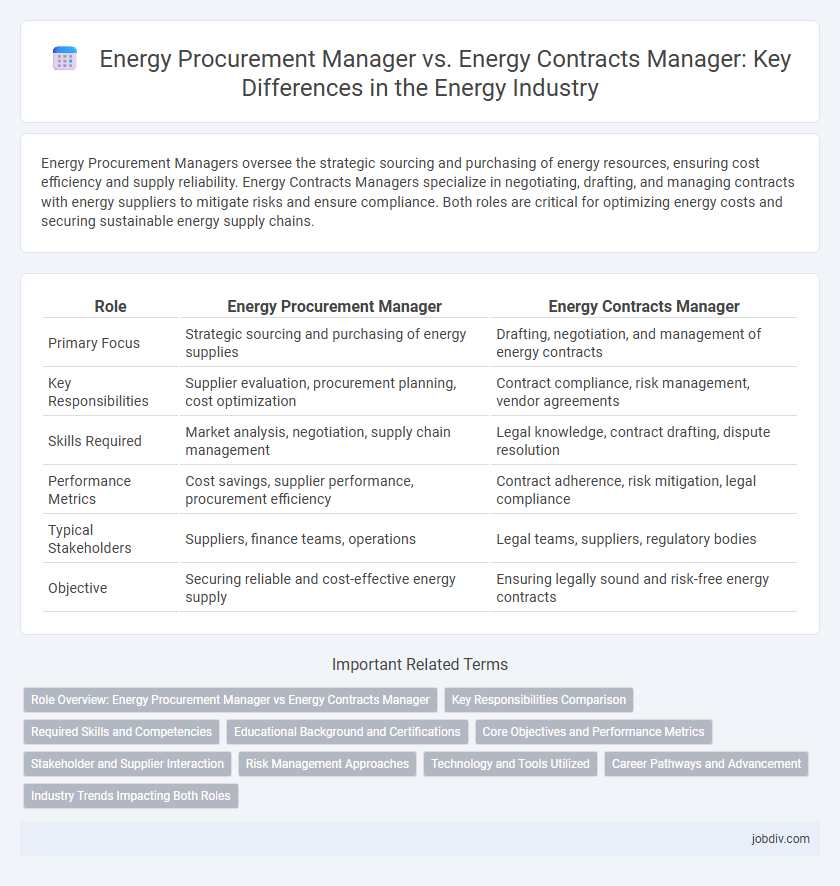Energy Procurement Managers oversee the strategic sourcing and purchasing of energy resources, ensuring cost efficiency and supply reliability. Energy Contracts Managers specialize in negotiating, drafting, and managing contracts with energy suppliers to mitigate risks and ensure compliance. Both roles are critical for optimizing energy costs and securing sustainable energy supply chains.
Table of Comparison
| Role | Energy Procurement Manager | Energy Contracts Manager |
|---|---|---|
| Primary Focus | Strategic sourcing and purchasing of energy supplies | Drafting, negotiation, and management of energy contracts |
| Key Responsibilities | Supplier evaluation, procurement planning, cost optimization | Contract compliance, risk management, vendor agreements |
| Skills Required | Market analysis, negotiation, supply chain management | Legal knowledge, contract drafting, dispute resolution |
| Performance Metrics | Cost savings, supplier performance, procurement efficiency | Contract adherence, risk mitigation, legal compliance |
| Typical Stakeholders | Suppliers, finance teams, operations | Legal teams, suppliers, regulatory bodies |
| Objective | Securing reliable and cost-effective energy supply | Ensuring legally sound and risk-free energy contracts |
Role Overview: Energy Procurement Manager vs Energy Contracts Manager
An Energy Procurement Manager oversees the strategic sourcing and purchasing of energy resources, ensuring cost-efficiency and supply reliability for organizations. In contrast, an Energy Contracts Manager specializes in drafting, negotiating, and managing energy supply agreements to mitigate risks and ensure regulatory compliance. Both roles collaborate closely to optimize energy acquisition and contractual obligations within the energy sector.
Key Responsibilities Comparison
Energy Procurement Managers focus on sourcing and purchasing energy supplies, negotiating prices, and managing supplier relationships to ensure cost-effective and reliable energy acquisition. Energy Contracts Managers specialize in drafting, reviewing, and managing energy contracts, ensuring compliance with regulatory standards, and mitigating risks associated with contract terms and obligations. Both roles require expertise in market analysis and regulatory knowledge, but procurement centers on supplier negotiations while contracts emphasize legal and compliance management.
Required Skills and Competencies
Energy Procurement Managers require expertise in supplier negotiation, cost analysis, and market trend evaluation to secure optimal energy sources at competitive prices. Energy Contracts Managers must possess strong legal knowledge, contract drafting skills, and risk management abilities to ensure compliance and favorable terms in energy agreements. Both roles demand proficiency in regulatory frameworks and stakeholder communication to optimize energy procurement processes effectively.
Educational Background and Certifications
Energy Procurement Managers typically hold degrees in business, supply chain management, or energy management, complemented by certifications such as Certified Energy Manager (CEM) or Certified Professional in Supply Management (CPSM). Energy Contracts Managers often possess educational backgrounds in law, business administration, or energy policy, with certifications like Certified Energy Contract Manager (CECM) or certification in contract management (CCM). Both roles benefit from advanced knowledge in energy markets, contract law, and negotiation skills to optimize procurement processes and manage contractual obligations effectively.
Core Objectives and Performance Metrics
Energy Procurement Managers focus on sourcing and purchasing energy supplies at the most cost-effective rates, optimizing supplier relationships, and ensuring compliance with market regulations. Their core performance metrics include cost savings, contract fulfillment rates, and procurement cycle efficiency. Energy Contracts Managers concentrate on drafting, negotiating, and managing energy agreements to mitigate risks and enforce contract terms, with key metrics such as contract compliance, dispute resolution time, and risk exposure reduction.
Stakeholder and Supplier Interaction
Energy Procurement Managers emphasize strategic negotiations with suppliers to secure cost-effective energy contracts while maintaining strong relationships with internal stakeholders to align procurement goals with organizational needs. Energy Contracts Managers focus on managing contractual obligations, ensuring compliance, and facilitating clear communication between suppliers and internal departments to mitigate risks and optimize contract performance. Both roles require collaboration with legal, finance, and operations teams, but Procurement Managers prioritize supplier engagement, whereas Contracts Managers concentrate on contract execution and stakeholder coordination.
Risk Management Approaches
Energy Procurement Managers focus on identifying and mitigating market risks by securing optimal energy purchase agreements and forecasting price fluctuations. Energy Contracts Managers emphasize contract-related risks, ensuring compliance, managing terms, and resolving disputes to protect organizational interests. Effective risk management integrates procurement strategies with robust contract oversight to minimize financial exposure and operational uncertainties.
Technology and Tools Utilized
Energy Procurement Managers primarily utilize digital procurement platforms and advanced analytics software to forecast energy needs and negotiate supplier contracts efficiently. Energy Contracts Managers focus on contract management systems and legal technology tools to draft, review, and ensure compliance with energy agreements. Both roles increasingly leverage AI-driven data analytics and blockchain for transparency, risk assessment, and operational optimization in the energy sector.
Career Pathways and Advancement
Energy Procurement Managers focus on sourcing and negotiating energy supply deals, developing strategic vendor relationships, and optimizing procurement costs, which positions them for advancement into senior supply chain or corporate strategy roles. Energy Contracts Managers specialize in drafting, reviewing, and managing complex energy contracts, ensuring compliance and risk mitigation, leading to career growth in legal advisory or regulatory compliance leadership within the energy sector. Both pathways offer horizontal mobility into project management or operational leadership, with advancement dependent on expertise in market trends, regulatory knowledge, and stakeholder management.
Industry Trends Impacting Both Roles
Energy Procurement Managers and Energy Contracts Managers face evolving industry trends such as the rise of renewable energy sources, increased regulatory complexity, and advances in energy market analytics. Both roles require adapting to dynamic pricing models and integrating sustainability goals into procurement and contract strategies. The shift towards decentralized energy production and digital contract management platforms significantly impacts decision-making processes and risk assessment.
Energy Procurement Manager vs Energy Contracts Manager Infographic

 jobdiv.com
jobdiv.com